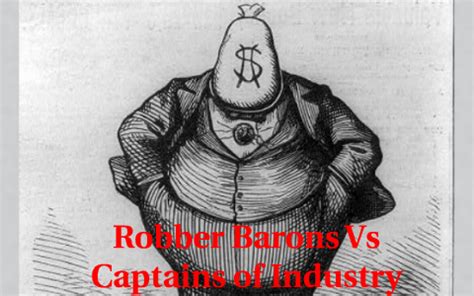Introduction

The rapid industrialization of America in the late 19th and early 20th centuries gave rise to a new breed of powerful business leaders known as captains of industry. These individuals, such as Andrew Carnegie, John D. Rockefeller, and J.P. Morgan, revolutionized their respective industries through innovation, technological advancements, and aggressive business strategies. However, their immense wealth and influence also drew criticism, with many accusing them of being robber barons who exploited workers and stifled competition.
Captains of Industry: The Builders
Captains of industry are often credited with transforming America into an industrial powerhouse. Through their entrepreneurial vision and business acumen, they created vast corporations that fostered innovation, expanded production, and raised living standards. They introduced advancements in manufacturing processes, transportation, and communication that boosted productivity and efficiency.
Robber Barons: The Exploiters
The term “robber barons” has been used to describe the negative aspects of some captains of industry. Critics alleged that they ruthlessly pursued profits at the expense of their employees, consumers, and competitors. They engaged in unfair business practices, such as monopolies, price fixing, and labor exploitation. The working conditions in their factories were often harsh and dangerous, with long hours, low wages, and inadequate safety measures.
Comparing Captains of Industry and Robber Barons
While both terms have become synonymous with the era of industrialization, there are key differences between captains of industry and robber barons.
| Characteristic | Captain of Industry | Robber Baron |
|---|---|---|
| Focus | Innovation, growth, wealth creation | Profit maximization, exploitation |
| Methods | Technological advancements, aggressive business strategies | Monopolies, price fixing, labor exploitation |
| Impact | Economic growth, job creation, improved efficiency | Wealth concentration, worker exploitation, consumer harm |
| Legacy | Mixed; admired for achievements but criticized for abuses | Negative; remembered as exploitative and ruthless |
The Shadow Side of Capitalism
The debate over captains of industry versus robber barons highlights the inherent tensions within capitalism. While the free market system has driven innovation and economic progress, it has also led to imbalances of power and wealth. Robber barons represent the excesses of capitalism, exploiting its flaws for personal gain.
Balancing Economic Growth with Social Responsibility
The legacy of the captains of industry and robber barons raises important questions about the role of business in society. While economic growth is essential, it must be balanced with social justice and environmental sustainability.
Effective Strategies for Responsible Capitalism
To prevent the abuses of robber barons, governments and businesses can implement various strategies to promote responsible capitalism:
- Encourage competition: Antitrust laws and regulations help break up monopolies and foster fair competition.
- Protect workers: Labor laws ensure safe working conditions, fair wages, and reasonable working hours.
- Promote transparency: Corporate reporting requirements provide stakeholders with information about business practices and performance.
- Encourage corporate social responsibility: Businesses should consider the social and environmental impact of their activities and actively contribute to society.
Conclusion
The distinction between captains of industry and robber barons is a complex and often fluid one. However, it is crucial to recognize the negative consequences that can arise from unchecked power and the importance of balancing economic growth with social responsibility. By understanding the historical lessons from this era, we can create a more just and equitable economic system that benefits all.
